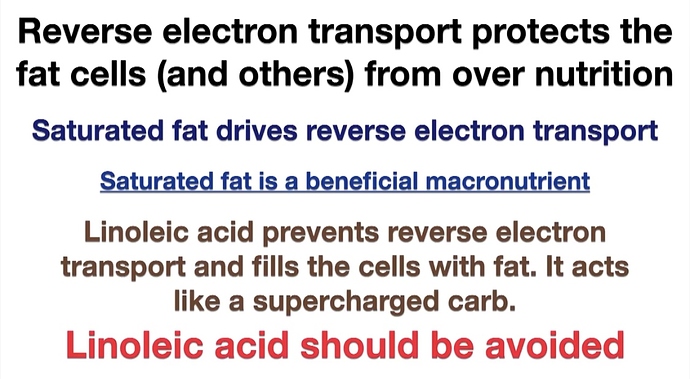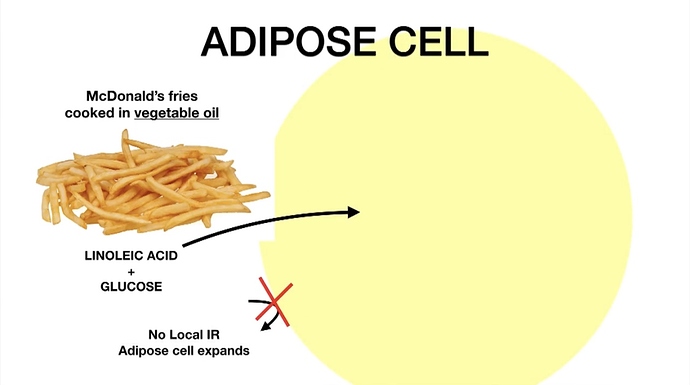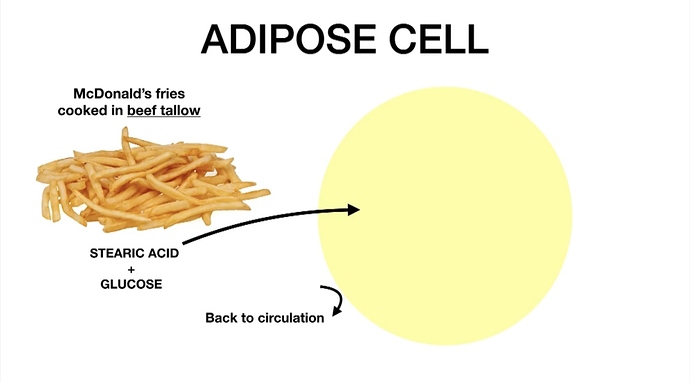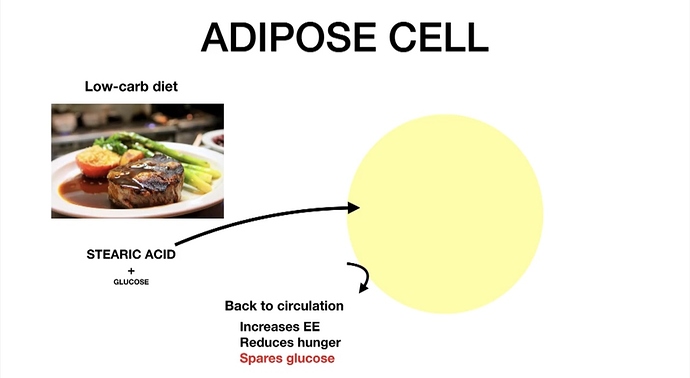Hi,
I am hoping someone can help me to understand. A friend has said polyunsaturaed fats cause diabetes. I said I thought it was sugar and carbohydrates. I asked them to show me the science, they sent me this link https://www.functionalps.com/blog/2012/07/17/diabetes-conversion-of-alpha-cells-into-beta-cells/
I know I have to keep my omega 3 greater than my omega 6, but I am not sure why? But isn’t the sugar and carbohydrates causing diabetes? If this is so can you point me to a clinical study that shows this. Thank you.
Polyunsaturated fats cause diabetes?
They have also sent me this, http://raypeat.com/articles/articles/glucose-sucrose-diabetes.shtml my head is now spinning. 
You are confusing type-1 with type-2 diabetes. The former is characterized by the inability to produce insulin and the latter by the need to produce excessive insulin
My belief is that type 2 diabetes is a problem of insulin and sucrose (table sugar) wreaks havoc on how insulin behaves. But I won’t say that PUFAs (mainly hydrogenated vegetable oils) are not part of the problem. From what I’ve read, they can cause problems on a celluar level, even in the pancreas, where insulin is produced. For me it’s much easier to place the blame for T2D on processed foods. Limiting both of these will reduce your risk for diabetes and lead to better health in general.
Moreover, I believe some of the people who use (shady) science to blame diabetes on either PUFAs or sugar specifically, but not both, have a financial motive to do so.
From Healthline: Diabetes risk increases from these factors:
- Body weight: Research shows that obesity is one of the main risk factors for type 2 diabetes but that losing just 5–10% body weight can reduce the risk (34).
- Exercise: People who live sedentary lifestyles have nearly twice the risk of developing type 2 diabetes compared to those who are active. Just 150 minutes per week of moderate activity can reduce the risk (35, 36).
- Smoking: Smoking 20 or more cigarettes per day more than doubles your risk of diabetes, but quitting brings the risk nearly back to normal (37).
- Sleep apnea: Sleep apnea, a condition in which breathing is obstructed during the night, is a unique risk factor for diabetes (38, 39).
- Genetics: The risk of developing type 2 diabetes is 40% if one of your parents has it and nearly 70% if both parents have it — suggesting a genetic link (40).
"A large number of studies have found that people who regularly drink sugar-sweetened beverages have a roughly 25% greater risk of type 2 diabetes (10).
In fact, drinking just one sugar-sweetened beverage per day increases your risk by 13%, independent of any weight gain it may cause (11).
Additionally, countries where sugar consumption is highest also have the highest rates of type 2 diabetes, while those with the lowest consumption have the lowest rates (12).
The link between sugar intake and diabetes still holds even after controlling for total calorie intake, body weight, alcohol consumption and exercise (13).
While these studies do not prove that sugar causes diabetes, the association is strong."
The metabolic disregulation hypothesis posits that obesity, Type II diabetes, cardiovascular disease, gout, Alzheimer’s disease, dental caries, hypertension, fatty liver disease, and a number of other conditions are all caused by insulin resistance resulting from chronically elevated serum glucose levels and the resulting chronic hyperinsulinemia. The term insulin resistance is used more and more as a synonym for metabolic disease/metabolic syndrome/syndrome X, the various terms used to describe the onset of the “diseases of civilization” or “diseases of the Western diet.”
Tucker Goodrich has evidence that the source problem is not the increase of refined sugar and refined grains in the diet, but rather the increased consumption of seed oils, with their very high percentages of polyunsaturated fatty acids, in the diet, beginning with the adulteration of lard with cottonseed oil that occurred in the nineteenth century in the U.S.
Goodrich may have identified a co-factor, but I don’t personally believe that seed oils can be the entire explanation, because diabetes was first diagnosed in classical antiquity in India, after the discovery of how to make sugar from sugar cane. (I am not clear whether the ancients were able to distinguish between Type I and Type II, however.) Because refined sugar and white flour were so labor-intensive and expensive to produce, gout and (Type II) diabetes were diseases of the rich until the nineteenth century, when new production methods made sugar and white flour inexpensive enough to be purchased at all economic levels of society. The (Type II) diabetes epidemic in the U.S., first observed by Elliott Joslin in the second half of the nineteenth century, followed the establishment of the U.S. sugar industry by about twenty years and tracks remarkably closely with sugar consumption.
We do know, however, that PUFA’s are inflammatory, and that inflammation is part of how hyperinsulinemia does its damage to the body, so it might not be all that much of a stretch to say that they “cause” diabetes, but not if sole cause is meant. It is a well-known fact that (Type II) diabetes, obesity, and cardiovascular disease are more prevalent among people who eat a diet that is simultaneously rich in both carbohydrate and fat (think doughnuts, ice cream, etc.).
That link discussing the transdifferentiation of α-cells into β-cells is very interesting. It is a real phenomenon, apparently, but it must not be controllable, or we’d have it as a treatment for Type I diabetes. Type I is an autoimmune disease, in which the body attacks and kills the β-cells in the Islets of Langerhans in the pancreas. The cause is unknown. Type II diabetes is a disease of carbohydrate intolerance, in which chronic hyperglycemia leads to insulin resistance and hyperinsulinemia. Type III diabetes is Alzheimer’s disease (some people believe, by the way, that all dementia is Alzheimer’s disease). These are both forms of metabolic syndrome and are currently believed by most people to be caused by excessive carbohydrate intake, although I don’t believe that Goodrich’s seed-oil hypothesis can be discounted, just yet.
As for the ratio of ω-3 to ω-6 fatty acids, I believe 1:1 is acceptable. Both types of PUFA are essential to the human diet, and they compete for the same receptors, so they need to be in balance. But ω-6 fatty acids, while essential, cause inflammation when consumed to excess (as, for example, in seed oils). While these two types of fatty acids are essential, they are not needed in great quantity.
By the way, raypeat.com is a site about homeopathy, which has been completely discredited in randomized controlled trials. I would be very careful about trusting information presented on that site.
Only when you hydrogenate (interesterified fat) or partially hydrogenate (trans fat) a polyunsaturated vegetable oil/fat or any fat for that matter?
Interesterified Fat? Who knows how this will go?
Maybe this[1] will kill us faster than trans fats[2]?
And maybe chemical extracted and processed fats/oils[3] are not so good either other than extra virgin cold pressed (no heat; not missing electrons; oxidation)?
Thought this video was interesting:
Virgin olive oil and liver meet hydrogen peroxide.
Wanted comment further on this rather crude example in the video above of some students playing around in a school lab.
Notice those giant bubbles forming at the bottom of the cup with the raw liver when it is hit with hydrogen peroxide, now imagine those giant bubbles at the bottom are your adipose fat tissue swelling up from inflammation? Much like Dr. Michael Eades MD, PhD, describes here? Now throw some High Fructose Corn Syrup HFCS on top of those trans fats and you get obesity and diabetes…eventually?
References:
[2] Hydrogenation & Industrial Application: “…partially hydrogenated vegetable oils are cheaper than animal fats, are available in a wide range of consistencies, and have other desirable characteristics (such as increased oxidative stability and longer shelf life), they are the predominant fats used as shortening in most commercial baked goods. A side effect of incomplete hydrogenation having implications for human health is the isomerization of some of the remaining unsaturated carbon bonds to their trans isomers. Trans fats (resulting from partial hydrogenation) have been implicated in circulatory diseases including heart disease.[26] The conversion from cis to trans bonds is chemically favored because the trans configuration has lower energy than the natural cis one. At equilibrium, the trans/cis isomer ratio is about 2:1. Many countries and regions have introduced mandatory labeling of trans fats on food products and appealed to the industry for voluntary reductions.[27][28][29] The food industry has moved away from partially hydrogenated fats (i.e. trans fats) and towards fully hydrogenated fats and interesterified fats in response to bad publicity about trans fats, labeling requirements, and removal of trans fats from the FDA list of foods Generally Recognized as Safe.[30][31][32] …”…More
[3] The Dangers of Vegetable Oil Extraction and Processing: An inside look at the nutritional and health problems associated with vegetable oil extraction and refining. By Paul Hawken and Fred Rohe November/December 1971
Fat cells live for 10 years, where is the science
Source for rendered fats resulting in increased triglycerides
One might also expect that lifestyle and eating habits are suspect here, the way parents eat and live could lead to them developing diabetes and eating habits and activity habits are learned from parents. We tend to like the foods we grew up with. Two obese parents will usually have obese children because kids learn eating habits from parents. So I think it’s a learned habit more likely than actual genetics. If both parents have diabetes but their child were to eat and live differently, say they were adopted at birth I believe the surrogate parents would have more influence on whether that child would be prone to T2 developing. It’s just my theory, I don’t have any evidence but it seems to me anyone can develop T2 with a bad diet and lifestyle. 
Haven’t finished reading through that, but interesting that they are targeting “added sugars” rather than “any sugar” which is the claim about T2D-Sugar association that I have heard (granted with more blame usually on Fructose molecules in particular, though whether they show up in Sucrose, Glucose, HFCS, organic grapes, whatever, doesn’t seem to make a huge difference except for the presence of Fiber which may or may not change the situation).
I’d imagine that’s because the more popular discussion of late, at least with any government action in the U.S., has been around Added Sugars, with labels not expected to list added sugars separately, treating them as categorically different and worse than ‘natural sugars’ for whatever reason.
I largely agree with this, though there is something to be said about the ratio when it comes to the associated cholesterols actually being used for their purposes of inflaming and anti-inflammation in response to an injury, and whether you have enough of the one to counter the response of the other.
I would say though that there are a few other problems than just seed oils, but perhaps that depends on how narrowly you define a seed oil (Corn and soybean oil don’t have seed in the name and aren’t often thought of as seeds, though technically they serve a similar purpose).
I won’t say that sugar is the entire problem but I wouldn’t say that it’s not a large part of the problem. I base this belief mainly on how Jason Fung reverses T2D in many of his patients:
" How to Reverse Diabetes
Once we understand type 2 diabetes, then the solution becomes pretty bloody obvious. If we have too much sugar in the body, then get rid of it. Don’t simply hide it away so we can’t see it. There are really only two ways to get rid of the excessive sugar in the body.
- Don’t put sugar in.
- Burn it off.
That’s it. That’s all we need to do. The best part? It’s all natural and completely free. No drugs. No surgery. No cost."
https://idmprogram.com/reverse-type-2-diabetes-the-quick-start-guide/
Isn’t their shift in diet proof enough? There’s quite a few indigenous populations who ate lots of highly unrefined carbs and never even heard of diabetes until they had regular access to processed foods. Sure it’s correlation but it’s covincing enough for me.
And this is how science is supposed to work. Challenging everything, even your own beliefs and trying to disprove them is the best way to get the entire picture.
BTW, I really liked the Hindu fable in the first study you posted:
An ancient Hindu fable tells of six learned blind men who approach an elephant. All are highly esteemed, but all are blind. The first blind man approaches the elephant and happens to bump up against its broad and sturdy side and declares “the elephant is very like a wall!” The second blind man feels the tusk and cries an elephant is “very much like a spear!” The third happens to grab the elephant’s squirming trunk in his hands and boldly declares the elephant is “very like a snake!” The fourth blind man palpates the leg of the elephant and declares “it is clear the elephant is very like a tree!” The fifth blind man who happens to touch the elephant’s ear declares “even the blindest man can tell that the elephant is very like a fan”. The sixth blind man happens to grasp the swinging tail and declares to his comrades the elephant is “very like a rope!”
What then ensues is a long, passionate argument filled with heated dispute amongst these learned men which gets them nowhere. Although each is partly right, none of them has seen the whole picture (while learned, they are blind, after all!). This fable has been utilized in many different eras and many different cultures to recount arguments in areas as diverse as theology and politics. It illustrates the inaccuracy of seeing only a part of a subject and assuming that it is the whole. It is a cautionary tale that even learned men can sometimes be misled by their preconceived notions or only seeing a portion of the whole.
Hmmm? If you eat fat with sugar that would be not so good? Eat only fat with little to no sugar and you will be in ketosis? (you will find no human study that would show a “relative” or “same risk”)
If you were to eat 20 teaspoons of table sugar (beet/cane) and 20 teaspoons of High Fructose Corn Syrup a DAY? No exercise? I wonder what your individual chances of developing a fatty liver (NAFLD) would be within 18 days? I would wager a pretty good chance? (important caveat: don’t try this at home folks because it just might work…)
I still have a problem with this, even if you’re genetically predisposed to developing diabetes it’s still contingent on a poor diet and lifestyle. Otherwise everyone who has that genetic pattern would probably get it. It may increase the likelihood that you’re going to develop it on the SAD but if it was all about genetics then the keto diet wouldn’t fix it. I can’t I believe that sugar and carbs don’t lead you down the path towards diabetes. Too many folks have reversed their conditions by just eating keto to not believe that eating a ketogenic diet will keep pretty much everyone from developing diabetes if they don’t have it already and in case they do it’s a fix. Seems like the most reasonable explanation to me. Common sense. 
I started my autistic son on keto a month ago. He’s older and not in school anymore. You can hope your eating habits will rub off on him. 
From what I understood from various presentations and writings of Drs. Lustig, Phinney, Volek and Fung, and others, @alexelcu has the predisposition from parents idea correct in that genetics, early exposure, habits, and perhaps epigentics are major factors, and environment is, in a way, secondary.
But, that is to say: the environment can trigger the response of the predisposition, and practically is the only thing we can do anything about right now (can’t change your parents or the past, dna manipulation isn’t really very viable and available for humans at the moment, though epigenetics could potentially be tweaked in what I would consider still crude ways, though that also can involve changes in diet and other environmental factors).
How they work together? It’s generally considered that different people, genetically or otherwise, have different general levels of insulin resistance. While this can perhaps increase do to exposure over time, it’s also a matter of some appear (at this time) to start with higher or lower resistance, and it seems to be on a kind of sliding scale (rather than binary of high and low resistance or something), which seems to be likely genetics related, though it may involve other early development factors as well. This doesn’t entirely mean anyone in this group will necessarily develop T2D, obesity, etc., but the likelihood increases with increased and continual exposure to insulin over time (which may itself also increase resistance over time). What this boils down to is there is a subset of the population that is highly unlikely to develop these problems because of their genetics, regardless of what they eat (or, at least, they won’t develop them specifically due to insulin/sugar, which right now is our primary consideration), another subset that is highly prone to these problems based on what/how they eat (if what they eat triggers an insulin response, or a high insulin response, and frequently enough), and several other subsets that fall somewhere between the two, and are likewise influenced by how much insulin over a period of time they are exposed to based on various factors of what/how they eat.
Very likely, the above should be caveated with “along with additional factors”, the problem is, those other factors, at the moment, appear to be even less clear.
The early womb exposure issue is actually more or less the same as eating though, as it’s usually attributed to the mother eating extra high insulin inducing foods and thus the child becoming exposed to the insulin in the blood earlier and developing a tolerance/resistance earlier.
All that said, no, this kind of exposure is not the only thing that can trigger a problem for anyone. Dr. Lustig, back before he was particularly involved with the ketogenic community and wouldn’t really endorse it, also had stories from his practice of young patients that rather suddenly developed obesiety and other problems in a short time due to a severe head injury which altered some hormone production, which I believe was treated with either drugs or surgery (or both) because of it’s particular nature, and one can imagine something like could show up in a person without an injury due to genetics/mutations. Radiation can also screw stuff up in odd ways, though generally we’d consider that an environmental problem as well.
And, all that said, there are other, perhaps less understood, hormones that can come into play here. Insulin and sugar exposure just, at the moment, appears to be the most common trigger for many people. That doesn’t mean it’s the only one. Even Dr. Fung and several others who generally promote a ketogenic diet will talk about working with a particular person and not recommending a ketogenic diet for their particular situation, but rather address some other problem (cortisol levels, for instance, which is the most common other hormone blamed for issues, but again perhaps not the only other).
These are indeed complex systems we’re dealing with, and there is, at this time, no “one size fits all” solution (despite how some like to hype things). When I started the ketogenic diet, I honestly wasn’t looking for much, and hadn’t been convinced of every claim, I was merely convinced this was “not dangerous” and had potential for health benefits, and simply the easiest way to get away from things I was convinced were unhealthy.
Dr. Lustig discusses brain damage as a cause of obesity, both to illustrate the mechanisms involved, and to dismiss the idea of “it’s your fault you’re fat.” Some of his stories are startling.
Here is his latest contribution to the discussion:
Coconut oil is derived from the meat of the coconut which resides within the endocarp (seed of the coconut drupe). It’s still a seed oil, but it’s a fruit seed oil.
I hope he’s right, because I do enjoy an apple from time to time, lol!
It was Dr. Lustig’s lecture, “Sugar: The Bitter Truth,” that got me eating this way. Scared the crap out of me, and helped me admit I’m a sugar-addict. It worked, too, because even though diabetes runs rampant through both sides of the family, my bloodwork is now all normal.
That’s what got me interested as well. I became convinced of that side of things first, and after doing additional research became convinced Keto was the easiest way to get away from sugar, or whatever was the real problem, and was safe. Though, technically, I started keto as a test to ensure it was safe while continuing to restrict the sugar my kids ate. (I’m not one that ever had diabetes or anything, though I was a bit overweight by the time I started).
Just be aware that, as any dietician can tell you, keto is unsustainable and will kill us. I plan for keto to kill me at age 106 while sky-diving, lol! 







